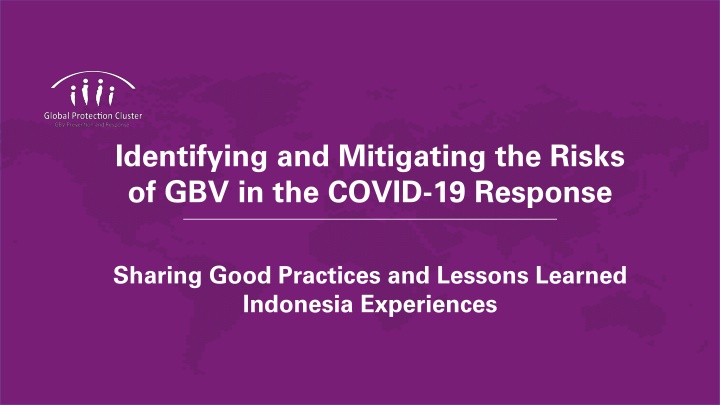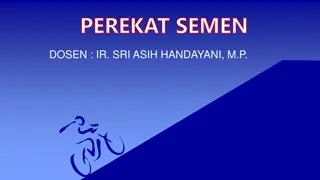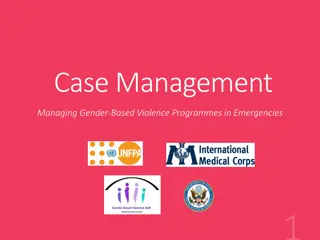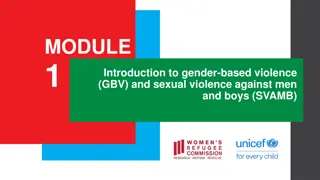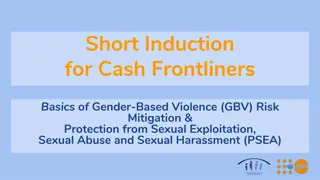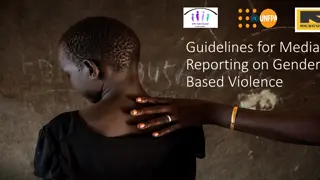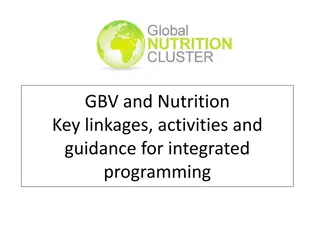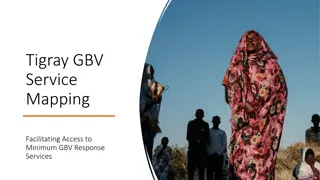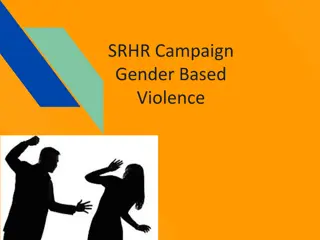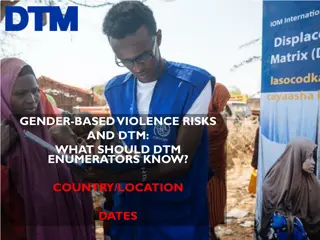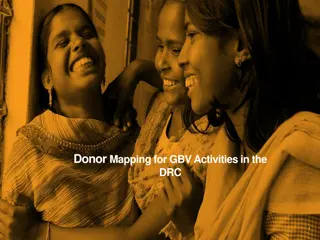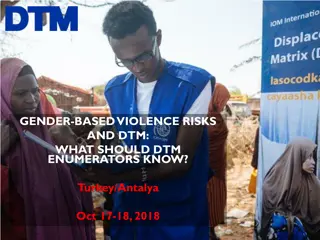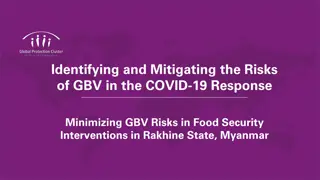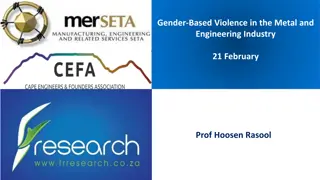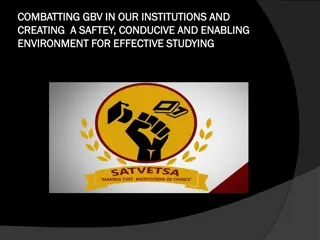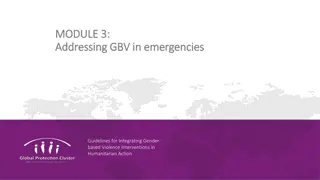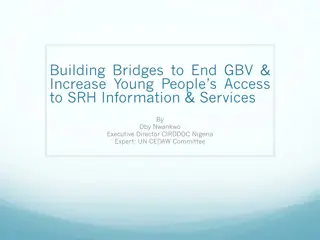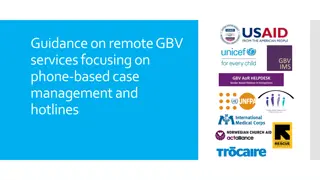Mitigating GBV Risks in COVID-19 Response: Lessons from Indonesia
In Indonesia, the COVID-19 response initially lacked gender responsiveness, leading to increased GBV cases and challenges in providing services. Efforts were made to develop protocols, advocate for gender-responsive policies, and enhance NGO capacities for monitoring and advocacy. The focus was on integrating GBV interventions into humanitarian actions during the pandemic.
Download Presentation

Please find below an Image/Link to download the presentation.
The content on the website is provided AS IS for your information and personal use only. It may not be sold, licensed, or shared on other websites without obtaining consent from the author.If you encounter any issues during the download, it is possible that the publisher has removed the file from their server.
You are allowed to download the files provided on this website for personal or commercial use, subject to the condition that they are used lawfully. All files are the property of their respective owners.
The content on the website is provided AS IS for your information and personal use only. It may not be sold, licensed, or shared on other websites without obtaining consent from the author.
E N D
Presentation Transcript
Identifying and Mitigating the Risks of GBV in the COVID-19 Response Sharing Good Practices and Lessons Learned Indonesia Experiences
Background Background At first, the programs or national policies related to the COVID 19 response were not gender responsive, as women machinery is not part of the COVID 19 Task Force. But then in May, MOWECP becomes the member. Increase report of GBV cases. Three times higher than normal situation. Limited services for GBV victims. Government re-allocated budget to contain the virus. Many shelters are closed. Limited knowledge of frontline service providers, including community network, on how to provide services during pandemic. Increase number of women migrant workers who return from abroad because of lockdown and other related policies to contain the virus in the destination countries. Their vulnerability to exploitation and GBV incidents increases as they travel from abroad to their hometown. Guidelines for Integrating Gender-based Violence Interventions in Humanitarian Action
Guideline/Protocol Development (MPTF, SAF and Japan Fund) Guideline/Protocol Development (MPTF, SAF and Japan Fund) Supported MOWECP in the development of: 1) Umbrella Protocol for Protecting Women from GBV during COVID-19. (MPTF Project in collaboration with UNFPA). 2) Protocol for Handling GBV and Trafficking Cases of Women Migrant Workers during COVID-19 (adopted and published in COVID Task Force Website). (SAF Program) The umbrella protocol contains situation analysis of The Pandemic in a Gender Lens, Standard Guidelines with Minimum Criteria for the Protection of Women's Rights from Gender-Based Violence in Outbreak Situations Including the Covid-19 Pandemic, Essential Guidelines and Advocacy Messages, Roles and Inter-Sectoral Coordination at National and Sub National Levels, Key Messages on Communication, Education, and Information for Community Empowerment. Follow up actions: Socialization of the Protocol to government and non-government agencies at National and Sub-National level ( SAF and Japan Fund). This will be done through series of online webinar and development of communication materials and animation videos to support the socialization. Guidelines for Integrating Gender-based Violence Interventions in Humanitarian Action
Advocacy for Gender Responsive COVID 19 policies (Japan Fund) Advocacy for Gender Responsive COVID 19 policies (Japan Fund) Output: Key government agencies and women s groups and networks have the capacity to contribute to national and sub-national gender-responsive policies on COVID-19 and its prevention and continue to provide protection and prevention services. Establish women NGOs networks to develop monitoring tools and enhance their capacities in advocating gender responsive policies of COVID 19 response. This includes how GBV risk mitigation is integrated into the COVID 19 prevention, response and recovery. Desk Review existing monitoring tools. Target: six women NGOs located in five different areas (Jakarta, Semarang, Surabaya, Cirebon, Lampung) Activities include: Development of monitoring tools of government s policies related to prevention and handling GBV cases during COVID-19 Pandemic; Implementation of monitoring and analysis on government s policies; Workshop on policy analysis from policy monitoring results; Publication of policy analysis; Hearing with relevant stakeholders regarding the monitoring results; Workshop to develop advocacy strategy to prevent and response GBV during COVID 19. Guidelines for Integrating Gender-based Violence Interventions in Humanitarian Action
Shelter and Hotline Provision Shelter and Hotline Provision (Japan Fund and SAF) (Japan Fund and SAF) Support non-government Women Crisis Centers and women network at community in providing shelter and hotline during pandemic. Currently we are supporting three women NGOs located in Jakarta (LBH APIK), in Cirebon district (Mawar Balqis) and in Bandung (Pasundan Durebang). Under this program, in addition to provide psycho-social support and referrals, these NGOs also conduct capacity building for women network at community in providing support to women survivors of GBV; update service directories and circulate it to the community; outreach and share information on GBV and trafficking through religious and cultural events and gatherings; develop internal protocol, referring to the MOWECP Protocol for GBV handling during Pandemic. Guidelines for Integrating Gender-based Violence Interventions in Humanitarian Action
PPE Kits and Information Material PPE Kits and Information Material Distribution (SAF and HIV ) Distribution (SAF and HIV ) Target: 1) Migrant worker returnees who are quarantined in the Ministry of Social Affair-owned shelters in transit area in Tanjung Pinang and Jakarta. 2) Women living with HIV in five target areas. Distributed 3000 PPE kits for WMW and 1400 PPE kits for WLHIV with support from local CSOs that provide support services to WLHIV. The package include PPE kits (cloth masks and hand sanitizer) and information materials on Intimate Partner Violence, Safety Plan, Trafficking in Person and List of Service Directories. Guidelines for Integrating Gender-based Violence Interventions in Humanitarian Action
Challenges Challenges Lack of coordination among service providers (police, justice, social, health sector) Lack of awareness and gender perspective among government officials, resulting in deprioritizing GBV services within their COVID response policies Community receptions toward the program Guidelines for Integrating Gender-based Violence Interventions in Humanitarian Action
